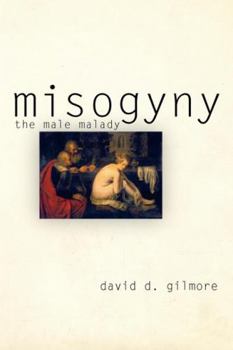Misogyny: The Male Malady
Select Format
Select Condition 
Book Overview
"Yes, women are the greatest evil Zeus has made, and men are bound to them hand and foot with impossible knots by God."--Semonides, seventh century B.C.
Men put women on a pedestal to worship them from afar--and to take better aim at them for the purpose of derision. Why is this paradoxical response to women so widespread, so far-reaching, so all-pervasive? Misogyny, David D. Gilmore suggests, is best described as a male malady, as it has always been a characteristic shared by human societies throughout the world. Misogyny: The Male Malady is a comprehensive historical and anthropological survey of woman-hating that casts new light on this age-old bias. The turmoil of masculinity and the ugliness of misogyny have been well documented in different cultures, but Gilmore's synoptic approach identifies misogyny in a variety of human experiences outside of sex and marriage and makes a fresh and enlightening contribution toward understanding this phenomenon. Gilmore maintains that misogyny is so widespread and so pervasive among men that it must be at least partly psychogenic in origin, a result of identical experiences in the male developmental cycle, rather than caused by the environment alone. Presenting a wealth of compelling examples--from the jungles of New Guinea to the boardrooms of corporate America--Gilmore shows that misogynistic practices occur in hauntingly identical forms. He asserts that these deep and abiding male anxieties stem from unresolved conflicts between men's intense need for and dependence upon women and their equally intense fear of that dependence. However, misogyny, according to Gilmore, is also often supported and intensified by certain cultural realities, such as patrilineal social organization; kinship ideologies that favor fraternal solidarity over conjugal unity; chronic warfare, feuding, or other forms of intergroup violence; and religious orthodoxy or asceticism. Gilmore is in the end able to offer steps toward the discovery of antidotes to this irrational but global prejudice, providing an opportunity for a lasting cure to misogyny and its manifestations.Format:Paperback
Language:English
ISBN:0812217705
ISBN13:9780812217704
Release Date:September 2009
Publisher:University of Pennsylvania Press
Length:272 Pages
Weight:0.85 lbs.
Dimensions:0.8" x 6.0" x 8.9"
Customer Reviews
5 ratings
And now for the female malady
Published by Thriftbooks.com User , 22 years ago
After reading this book I was inspired to think about a work to complement it for all the feminists out there, entitled, "Misoandry," (a word which is probably a contraction of "me so angry").As a budding misogynist myself who's recovering from a typical American upbringing in which I was taught to uncritically worship and indulge women who were probably completely undeserving of such adulation, I found this to be an invaluable guide to reforming my uxorious and adulatory ways with respect to the fairer sex.Of course, women have their problems in life too. They have menarche, menopause, mental stress, and mendacious partners to deal with. Notice that all these words start with the word "men," which is no doubt where all their problems come from. I'm sure my book on misoandry will be a runaway bestseller and make me a cult millionaire with all those rabid, man-hating feminists.
Front-Heavy, But Good.
Published by Thriftbooks.com User , 22 years ago
Though I agree with some points of Miss Berden's analysis, especially the catalog nature of Mr. Gilmore's book, I find his observations about male frailty and victimization to be quite adroit. These points were meant as entreaties to male readers, and not intended to deflect blame. Anyone with any sense of education knows who's getting the raw end of misogyny, and the male population would be served well by delving deep into the cultural roots of our abusive behavior, which are documented quite well (with an exception or two) in Mr. Gilmore's text. The problem I have with the book is that the documentation of cultural practices weigh down the first two thirds of the read so as to almost overwhelm you before you approach his altruistic conclusions at the end. Other than that, I thought it was quite a refreshing look from a male approach.
Dark Side of the Mood?
Published by Thriftbooks.com User , 23 years ago
This book was a remarkable eye-opener as I was originally searching for a copy of 'The Book of Miso : Savory, High-Protein Seasoning' by William Shurtleff and Akiko Aoyagi. However, although my culinary desires went unsatisfied, this work more than compensated me with its keen insights into an area heretofor unknown to me. Henry Raddick's comments are, of course, the definitive review; I am somewhat surprised, however, that he omitted to comment on this fascinating (and courageous) change of genre by Mr. Gilmore. I am pleased to correct the omission. From his (arguably humble) beginnings as groundbreaking prog-rock guitarist to professor of anthropology we can only laud this single-minded devotion in forsaking the pleasures of the music scene (clearly where one might derive considerable experience in misogyny) in order to dedicate oneself to a more studious discipline. May I therefore honour Gilmore's frankness. Come on, McCartney, Daltrey and Jagger - the academic gauntlet has been thrown down!
First rate
Published by Thriftbooks.com User , 23 years ago
An excellent guide which I, and by extension my shrew of a wife, thoroughly enjoyed.
Misogyny
Published by Thriftbooks.com User , 23 years ago
This is a brilliant treatment of the subject of misogyny -- a must read for anyone seriously interested in gender studies.





